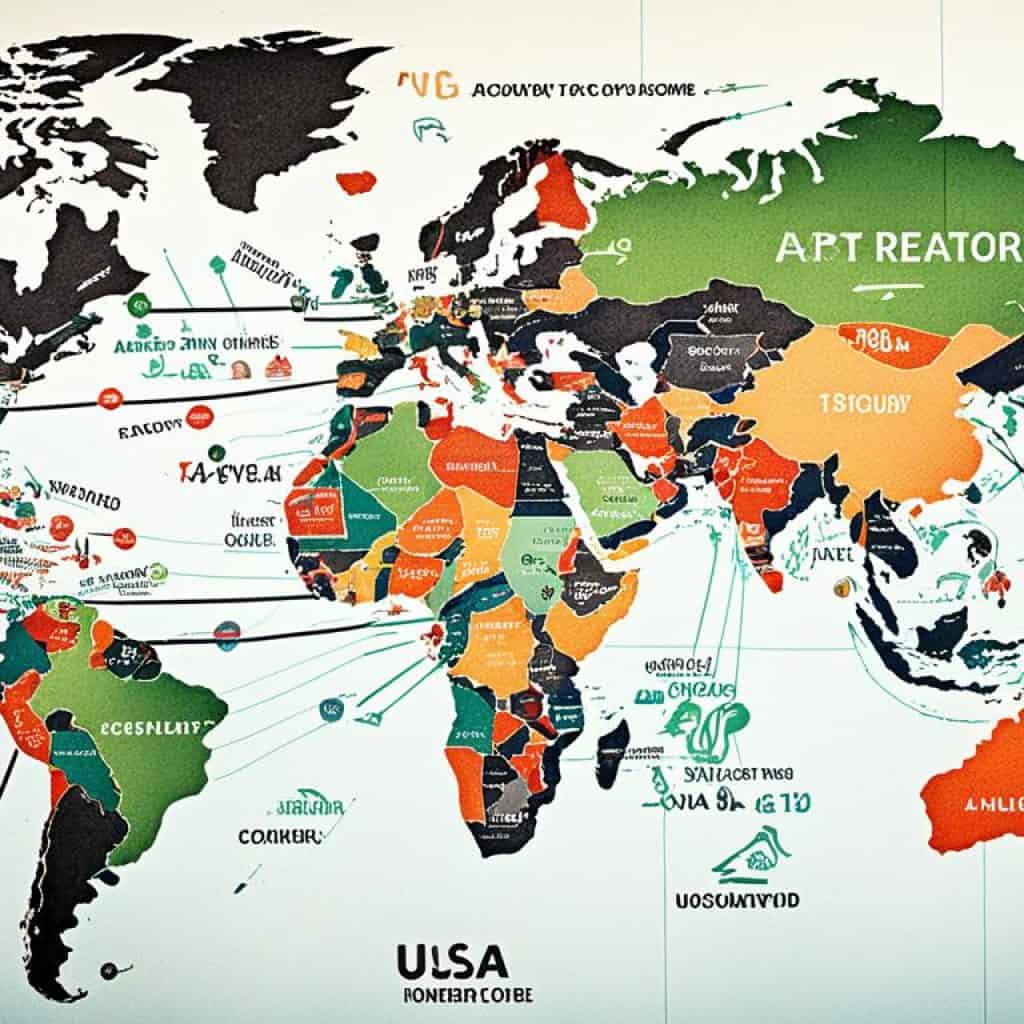Are you an American expat wondering about your US tax obligations? Do you want to file your taxes with confidence and minimize your tax liability? Discover the essential tips and tricks to navigate the complex world of US expat tax filing. From understanding your tax obligations to utilizing expat tax services, this article provides you with the knowledge and insights you need to file with ease.
Key Takeaways:
- As an American expat, it is crucial to understand your US tax obligations
- File your taxes with confidence and minimize your tax liability
- US expats can utilize expat tax services specifically tailored for expatriates
- Learn about deductions, exclusions, and tax treaties to lower your tax burden
- Consult with a tax professional specializing in expat tax matters for personalized advice
Do American Expats Have to Pay US Taxes?
Yes, American expats are required to pay US taxes. US citizens and resident aliens, regardless of their global location, are subject to US income taxes on their worldwide income. This means that even if an American expat earns income abroad, they may still have a US tax liability. However, the IRS provides various provisions and exclusions that can help reduce the tax burden for American expats.
One of the main provisions that can benefit American expats is the Foreign Earned Income Exclusion (FEIE). The FEIE allows qualifying expats to exclude a certain amount of their foreign-earned income from US taxes. For tax year 2022, the maximum exclusion amount is $108,700 per qualifying individual.
“The Foreign Earned Income Exclusion can be a valuable tool for American expats to reduce their US tax liability while living and working abroad.”
Additionally, American expats may be eligible for various tax credits and deductions to further reduce their tax liability. For example, the Child Tax Credit and the Foreign Tax Credit can be utilized to offset the US tax obligations of American expats.
It’s important to note that while American expats have responsibilities to pay US taxes, the US tax system also provides opportunities for expats to minimize their tax burden. By understanding their tax obligations and taking advantage of available provisions, American expats can navigate the US tax landscape with confidence.
Next, let’s explore whether American expats have to file a federal tax return and the potential consequences of failing to do so.
Do American Expats Have to File a Federal Tax Return?
Yes, American expats are required to file a federal tax return if they earn above the minimum income threshold. The income threshold is typically equivalent to the Standard Deduction amount for their filing status and age. Filing a federal tax return is a crucial requirement for American expats to fulfill their US tax obligations and ensure compliance with the Internal Revenue Service (IRS).
When it comes to US tax filing for expats, it is important to understand that your global income is subject to US taxation. Even if you earn income abroad, you may still have a US tax liability. Filing a federal tax return allows the IRS to assess your tax liability and determine if you owe any taxes based on your income, deductions, and credits.
However, as an American expat, there are certain deductions and exclusions available that can help lower your taxable income and potentially eliminate your US tax liability. One notable exclusion is the Foreign Earned Income Exclusion (FEIE), which allows eligible expats to exclude a certain amount of their foreign-earned income from US taxes. By utilizing these deductions and exclusions, you can minimize your US tax liability and ensure that you only pay taxes on the income that is subject to taxation.
While filing a federal tax return as an American expat may seem daunting, there are expatriate tax services available to provide guidance and support. These services specialize in assisting expats with US tax filing and can ensure that you meet all the necessary requirements and deadlines. With the help of these expert tax professionals, you can navigate the complexities of US expat tax filing with confidence and peace of mind.
Do American Expats Have to File a State Tax Return?
For American expats, the question of whether to file a state tax return depends on the rules and requirements of their state of residence. Each state has its own regulations regarding state income tax filing, particularly for individuals who are no longer residents or earn income from that state.
Some states may still require American expats to file a state tax return if they have income sourced from that state, such as rental properties or business activities. However, other states may have specific provisions or exemptions for non-resident taxpayers or individuals residing outside of the United States.
To determine their state filing obligations, American expats are encouraged to consult with a tax professional who specializes in expat tax matters. These professionals have the expertise and knowledge to navigate the complexities of state tax laws and ensure compliance with any filing requirements.
Consulting a Tax Professional for State Tax Filing
When it comes to state tax filing for American expats, the assistance of a tax professional is invaluable. They can provide guidance on the specific rules and regulations of the state in question and help individuals understand their filing obligations.
A tax professional specializing in expat tax matters can assist with the following:
- Evaluating the individual’s residency status in the state
- Determining whether certain income is considered sourced from the state
- Identifying any applicable deductions or exemptions
- Ensuring compliance with state tax deadlines
By working with an expert, American expats can navigate the complexities of state tax filing and avoid any potential penalties or issues with the state revenue departments.
Consulting with a tax professional who specializes in expat tax matters is the best way for American expats to determine their state tax filing requirements and ensure compliance. These professionals have the expertise to navigate the complexities of state tax laws and help expats maximize their tax savings.
| State | Filing Requirement for American Expats | Key Considerations |
|---|---|---|
| New York | May require filing if income is sourced from the state | Consideration for non-resident taxpayers |
| California | May require filing if income is sourced from the state | Consideration for non-resident taxpayers |
| Texas | No state income tax | No filing requirement for state tax |
| Florida | No state income tax | No filing requirement for state tax |
| Washington | No state income tax | No filing requirement for state tax |
It’s important to note that the table above provides a general overview and is not exhaustive. State tax laws can vary, and it’s crucial for American expats to consult with a tax professional for personalized advice based on their specific circumstances.
By seeking professional guidance, American expats can ensure they fulfill their state tax obligations accurately and efficiently, while optimizing their overall tax situation.
How to File Taxes as an American Expat
As an American expat, filing your taxes correctly and on time is essential to ensure compliance with US tax obligations. Fortunately, the process of filing taxes as an American expat is similar to that of taxpayers residing in the United States. Whether you choose to e-file or mail your tax return, understanding the basic steps involved can help you navigate the process with confidence.
- Calculate gross income: Begin by determining your total income, including wages, self-employment earnings, rental income, and any other taxable income sources. Ensure that you accurately report all income earned both within and outside the United States.
- Claim deductions: American expats may be eligible for various deductions that can help reduce their taxable income. Common deductions include the Foreign Earned Income Exclusion, which allows you to exclude a portion of your foreign-earned income from US taxes, and the Foreign Housing Exclusion, which provides relief for housing expenses incurred abroad.
- Apply tax credits: Tax credits are powerful tools that can directly reduce your tax liability on a dollar-for-dollar basis. Explore available tax credits for American expats, such as the Child Tax Credit, the Foreign Tax Credit, and the American Opportunity Credit, depending on your circumstances.
- Determine tax liability: After applying deductions and tax credits, calculate your tax liability using the appropriate tax brackets and rates. It’s important to ensure accurate calculations to avoid underpaying or overpaying your taxes.
- File the tax return: Once you have completed the necessary calculations and gathered all required documentation, it’s time to file your tax return. You can choose between electronic filing (e-filing) or mailing a paper return to the Internal Revenue Service (IRS). E-filing is the most popular method due to its accuracy, faster processing times, and quicker refund delivery.
By following these steps and staying organized throughout the process, you can file your taxes as an American expat accurately and efficiently. Consider seeking the assistance of expatriate tax services, specifically tailored to meet the needs of American expats, for expert guidance and support.

When Are Expat Taxes Due?
As an American expat, understanding the deadlines for filing your US taxes is crucial to avoid penalties and ensure compliance. The tax due date for American expats is the same as for US citizens and residents living inside the US, which is usually April 15th.
However, American expats living abroad are granted an automatic 2-month extension to file their federal income taxes, making the deadline June 15th. This extension provides extra time for expats to gather the necessary documents and complete their tax returns accurately.
It’s important to note that while the filing deadline is extended, any taxes owed must still be paid by the original due date, April 15th, to avoid accruing interest on the outstanding balance.
It is advisable for American expats to start the tax preparation process early to ensure they have sufficient time to gather all the required information and seek professional assistance if necessary. Procrastinating may lead to last-minute stress and potential errors in the tax filing process.
By knowing the specific tax deadlines and understanding the implications of filing late or failing to pay taxes on time, expats can stay on top of their US tax obligations and avoid unnecessary complications.
Can Expat Taxes Get More Time to File?
If American expats find themselves needing more time beyond the automatic 2-month extension to file their taxes, they can request an additional extension to October 15th by filing Form 4868. This extension allows expats to have more time to gather necessary documents and ensure accurate tax filing. However, it’s important to note that any taxes owed must still be paid by the original filing date.
Requesting an extension does not alter the payment due date, and any unpaid taxes may accrue interest. Therefore, it is advisable for American expats to pay any outstanding taxes by the original due date to avoid additional financial penalties.
Extensions help to delay the filing deadline, providing expats with more time to prepare their tax returns thoroughly. It is essential to utilize this extra time effectively by working with expatriate tax services that specialize in US expat tax obligations. These services can assist expats in navigating the complexities of tax filing and ensuring compliance with all necessary requirements.
Additional Time to File and Pay - Key Points:
- American expats can request a further extension to file taxes by submitting Form 4868.
- Extensions do not postpone the payment due date for any taxes owed.
- It is crucial to pay any outstanding taxes by the original filing date to avoid accruing interest on the unpaid amount.
- Working with expatriate tax services can help ensure a smooth filing process and timely compliance.
By taking advantage of the additional time available through extensions, American expats can file their US expat taxes accurately and confidently. These extensions provide valuable breathing room, allowing for thorough preparation and the opportunity to maximize eligible deductions and credits.
What Penalties Do Expat Taxes Pay for Failing to File or Pay Taxes?
American expats who fail to file their tax return on time may face late-filing penalties. These penalties are designed to encourage timely tax compliance and ensure proper reporting of income. Understanding the potential penalties can help expats prioritize their tax obligations and avoid unnecessary financial consequences.
Late Filing Penalty
The late filing penalty is imposed by the IRS at a rate of 5% of the amount due with the return for each month that the return is late. This penalty can accumulate to a maximum of 25% of the unpaid tax amount. Therefore, it’s essential for expats to file their tax returns by the due date to avoid incurring these penalties.
“Filing your tax return on time is crucial to avoid late filing penalties. Make sure to stay organized and submit your return by the appropriate deadline.”
Late Payment Penalty
In addition to the late filing penalty, American expats who fail to pay their taxes on time may also face a late payment penalty. This penalty is typically 0.5% of the unpaid tax amount and is assessed for each month the tax remains unpaid. It’s important for expats to budget and plan ahead to ensure timely payment of their tax liabilities.
“Paying your taxes on time is equally important as filing your tax return promptly. By fulfilling your tax obligations promptly, you can avoid unnecessary penalties and interest charges.”
Minimum Penalty for Failure to File
For American expats who owe taxes and fail to file their tax returns, there is a minimum penalty imposed. This penalty is either $100 or 100% of the tax due, whichever is less. It’s crucial to note that this penalty is in addition to the late filing penalty and any late payment penalties that may have accrued.
“Failing to file your tax return can result in substantial penalties. Even if you owe taxes, make sure to file your return to avoid additional penalties on top of what you already owe.”

In summary, American expats must prioritize meeting their tax obligations and filing their returns on time to avoid penalties. By understanding the potential consequences of failing to file or pay taxes, expats can ensure compliant and timely tax filing.
How Can Expat Taxes Reduce Their Tax Liability?
American expats have several options to reduce their tax liability. By strategizing and employing smart tax planning techniques, expats can optimize their financial situation and minimize their US tax obligations.
One of the most common methods for reducing tax liability is by leveraging the Foreign Earned Income Exclusion (FEIE). The FEIE allows expats to exclude a certain amount of their foreign-earned income from US taxes. For the tax year 2022, the maximum excluded amount is $108,700 per qualifying individual. This exclusion can significantly reduce the taxable income for expats and lower their overall tax liability.
Additionally, expats can take advantage of various tax credits and deductions. The Foreign Tax Credit allows expats to offset their US tax liability by claiming a credit for taxes paid to foreign jurisdictions. This ensures that expats are not double-taxed on the same income. Other deductions, such as the Foreign Housing Exclusion, can further decrease taxable income for expats who incur housing expenses abroad.
Furthermore, expats can explore tax planning opportunities presented by international tax treaties. The United States has tax treaties with several countries that may provide additional benefits for expats. These treaties often address issues related to double taxation, allowing expats to eliminate or reduce their US tax liability through treaty provisions.
To navigate the intricate landscape of expat tax planning and ensure optimal tax savings, consulting with an expert expat tax specialist is highly recommended. These professionals have in-depth knowledge of US tax laws, international tax treaties, and the intricacies of expat tax planning. They will provide personalized advice tailored to your specific circumstances and help you maximize your tax savings while remaining compliant.
Benefits of Expat Tax Planning
“Proper expat tax planning not only helps reduce your tax liability but also provides a sense of financial security and peace of mind. By taking advantage of available tax provisions and working with an experienced expat tax professional, you can optimize your tax situation and focus on enjoying your expat life without unnecessary financial burdens.”
Comparison of Tax Reduction Strategies
| Tax Reduction Strategy | Description |
|---|---|
| Foreign Earned Income Exclusion (FEIE) | Allows exclusion of foreign-earned income from US taxes, up to a specified amount. |
| Foreign Tax Credit | Provides a credit for taxes paid to foreign jurisdictions to offset US tax liability. |
| Foreign Housing Exclusion | Allows exclusion of certain housing expenses from taxable income. |
| Tax Treaties | Provide additional tax benefits through treaties between the US and foreign countries. |
Combining these strategies and leveraging the expertise of an expat tax specialist, American expats can significantly reduce their tax liability and optimize their financial situation. By staying informed, proactive, and compliant with US tax laws and regulations, expats can confidently navigate the complexities of expat tax planning.
Understanding the US Tax Obligations for American Expats
American expats, no matter where they reside globally, have a legal obligation to fulfill their US tax obligations. This includes filing a federal tax return if their income exceeds the minimum threshold. Additionally, American expats may be required to pay taxes on their worldwide income. However, there are provisions and exclusions available to help reduce taxable income and minimize tax liability for expats.
It is crucial for American expats to have a comprehensive understanding of their US tax obligations to ensure compliant and efficient tax filing. By familiarizing themselves with the intricacies of the US tax system, expats can make informed decisions and take advantage of available tax benefits.
Filing a Federal Tax Return
American expats must file a federal tax return if their income exceeds the minimum threshold. This threshold is typically equivalent to the Standard Deduction amount for their filing status and age. Filing a tax return allows expats to report their income accurately and claim any eligible deductions and credits. Utilizing the services of expatriate tax specialists can provide the necessary guidance and expertise throughout the tax filing process.
Minimizing Tax Liability
American expats have access to various provisions and exclusions that can help minimize their tax liability. One such provision is the Foreign Earned Income Exclusion (FEIE), which allows expats to exclude a certain amount of their foreign-earned income from US taxes. Additionally, tax treaties between the US and foreign countries may provide further opportunities for reducing tax liability. Consulting with tax professionals specializing in expat tax matters can ensure expats take full advantage of these provisions.
“Understanding the intricacies of US expat tax obligations is essential for compliant and efficient tax filing.”
Choosing Expatriate Tax Services
When handling US expat taxes, it is advisable for American expats to seek the assistance of expatriate tax services tailored to their specific needs. These services can provide expert guidance on navigating the complexities of expat tax obligations, ensuring accurate filing and potentially maximizing tax savings. With professional support, expats can have peace of mind knowing their taxes are handled with precision and compliance.
| Benefits of Expatriate Tax Services | Benefits of Expert Guidance |
|---|---|
|
|
Seeking the services of expatriate tax professionals ensures that American expats receive expert guidance on reducing tax liability and achieving optimal tax compliance. With their expertise, expats can navigate the intricacies of US expat tax obligations with confidence.
Essential Information for the 2023 Tax Season
The 2023 tax season is a vital period for American expats to fulfill their tax obligations. It is essential to understand the universal filing requirement for American citizens, the importance of having a Taxpayer Identification Number (TIN), and the specific rules and considerations for non-citizens and green card holders. Staying informed about the minimum filing thresholds and key dates ensures a smooth and compliant tax season.
Universal Filing Requirement for American Citizens
All American citizens, including expats, are required to file a federal income tax return regardless of their residency status or where their income is earned. Expats must report their worldwide income to the IRS, taking into account any applicable exclusions or deductions available for expatriates. Failing to fulfill this filing requirement can result in penalties and complications in the future.
The Importance of Taxpayer Identification Number (TIN)
A Taxpayer Identification Number (TIN), such as a Social Security Number (SSN) or an Individual Taxpayer Identification Number (ITIN), is crucial for expats to file their tax returns. American expats who don’t have an SSN and are not eligible for one can apply for an ITIN by submitting Form W-7. Having a TIN ensures accurate identification and facilitates the tax filing process.
Specific Rules and Considerations for Non-Citizens and Green Card Holders
Non-citizens and green card holders have unique tax considerations when filing their US expat taxes. Resident aliens, including green card holders, generally follow the same tax rules as US citizens. However, non-resident aliens may have different tax obligations and may need to file Form 1040NR or 1040NR-EZ. Understanding the specific rules and considerations based on immigration status is crucial for accurate and compliant tax filing.
Minimum Filing Thresholds and Key Dates
Expats must be aware of the minimum filing thresholds to determine if they are required to file a tax return. The threshold amount varies based on filing status and age. It is vital to stay informed about these thresholds as they may change annually. Additionally, being familiar with the key tax dates, such as the deadline for filing a tax return and the due date for estimated tax payments, helps expats plan and organize their tax obligations effectively.
| Filing Status | Minimum Filing Threshold (2023) |
|---|---|
| Single | $12,550 |
| Married Filing Jointly | $25,100 |
| Married Filing Separately | $5 |
| Head of Household | $18,800 |
Understanding these essential pieces of information is crucial for American expats to navigate the 2023 tax season successfully. By being aware of the universal filing requirement for American citizens, obtaining a Taxpayer Identification Number (TIN), understanding the specific rules for non-citizens and green card holders, and keeping track of the minimum filing thresholds and key dates, expats can ensure a smooth and compliant tax filing process.

Key Tax Deadlines for American Expats in 2024
As an American expat, it’s essential to be aware of the key tax deadlines to ensure compliant and timely tax filing. The IRS generally begins processing tax returns in late January and has an official tax filing deadline of April 15th for most taxpayers. However, American expats residing abroad are granted an automatic 2-month filing extension, pushing their deadline to June 15th. It’s crucial to take advantage of this extension and stay ahead of these key tax deadlines to avoid penalties and maintain tax compliance.
Here is a breakdown of the relevant tax deadlines for American expats in 2024:
| Tax Deadline | Details |
|---|---|
| January 31st | The deadline for employers to issue Form W-2 to employees, reporting their wages and withholdings for the previous year. |
| April 15th | The traditional tax filing deadline for most taxpayers residing in the US. It’s important to note that American expats living abroad are granted an automatic extension to file until June 15th. |
| June 15th | The extended tax filing deadline specifically for American expats residing outside the US. Filing by this date helps avoid penalties for late filing. |
| October 15th | The final tax filing deadline for American expats who requested an additional extension beyond the automatic 2-month extension. Filing by this date is crucial to remain compliant and avoid further penalties. |
American expats should also be aware of other important tax-related deadlines:
- April 15th: Deadline to file the Foreign Bank Account Report (FBAR) for American expats who have financial accounts outside the US with a total value exceeding $10,000 at any time during the year.
- April 15th: Deadline to file Form 114, Report of Foreign Bank and Financial Accounts (FBAR) with the Financial Crimes Enforcement Network (FinCEN).
- Tax Year-End: Deadlines for making retirement plan contributions, such as Individual Retirement Accounts (IRA) and Health Savings Accounts (HSA). These deadlines vary depending on the specific plan requirements.
Staying informed and organized about these key tax deadlines is crucial for American expats to fulfill their tax obligations and avoid unnecessary penalties. It is always beneficial to consult with expatriate tax services that cater to American expats, as they can provide expert guidance and ensure timely compliance with all tax requirements.
Important Forms and Deadlines for American Expats
American expats must navigate a variety of forms and deadlines beyond the traditional tax return. Understanding these requirements is essential for comprehensive and compliant tax filing. Two critical forms that American expats need to be aware of are the Foreign Bank Account Report (FBAR) and the Foreign Account Tax Compliance Act (FATCA).
Foreign Bank Account Report (FBAR)
The FBAR mandates that American expats disclose their foreign financial accounts to the US government. By filing Form FinCEN 114, expats report their foreign bank accounts, brokerage accounts, and other financial interests. It is crucial to note that the FBAR deadline aligns with the federal tax return filing date, typically April 15th.
The FBAR also offers an automatic extension of the filing deadline, providing expats with additional time until October 15th to submit the form. This extension is valuable for those who require more time to gather the necessary information.
Foreign Account Tax Compliance Act (FATCA)
The FATCA aims to prevent tax evasion by US taxpayers with financial accounts held abroad. Under this act, American expats with significant offshore financial assets must report them to the IRS. The FATCA reporting is typically included within the federal tax return filing process.
Expats should carefully review the tax forms, such as Form 8938, to determine if they exceed the reporting thresholds specified by the IRS. A comprehensive understanding of the FATCA requirements ensures compliance and avoids potential penalties.
Overall Tax Filing Deadlines
While the FBAR and FATCA have specific deadlines, it is important to remember the general tax filing deadlines for American expats. Typically, the federal tax return and any associated forms are due by April 15th. However, American expats living abroad receive an automatic 2-month extension, making the filing deadline June 15th. It is essential to comply with these deadlines to avoid late filing penalties.
To provide a visual representation of the important forms and deadlines for American expats, below is a table summarizing the key information:
| Form | Deadline | Extension Deadline |
|---|---|---|
| FBAR (Form FinCEN 114) | April 15th | October 15th |
| FATCA (Form 8938) | Aligns with federal tax return filing | N/A |
By understanding the forms required and their respective deadlines, American expats can strategically plan their tax filing process and ensure a smooth and compliant experience.
Conclusion
Filing US expat taxes can be complex, but with the right knowledge and support, it can be a manageable process. Seeking the assistance of expatriate tax services tailored to American expats can provide the necessary guidance, expertise, and peace of mind.
Understanding your tax obligations, staying compliant with filing deadlines, and utilizing available tax provisions and exclusions can help you navigate the US expat tax landscape with confidence.
By working with experienced expat tax professionals, you can ensure that your tax filing is accurate and in accordance with the IRS regulations. They can help you take advantage of deductions, credits, and exemptions that you may be eligible for as an American expat, potentially reducing your tax liability or even eliminating it altogether.
Whether you’re a first-time filer or a seasoned expat, having access to reliable expatriate tax services is crucial. They can provide personalized advice, answer your tax-related questions, and ensure that you are fully compliant with all US tax laws. With their assistance, you can file your American expat tax return with confidence and peace of mind.
FAQ
Do American Expats Have to Pay US Taxes?
Yes, American expats are required to pay US taxes on their worldwide income.
Do American Expats Have to File a Federal Tax Return?
Yes, American expats are required to file a federal tax return if they earn above the minimum income threshold.
Do American Expats Have to File a State Tax Return?
Whether American expats have to file a state tax return depends on the rules and requirements of their state of residence.
How to File Taxes as an American Expat?
American expats can file their taxes electronically (E-filing) or through the mail.
When Are Expat Taxes Due?
The tax due date for American expats is usually April 15th, with an automatic 2-month extension to file.
Can Expat Taxes Get More Time to File?
Yes, American expats can request a further extension to October 15th by filing Form 4868.
What Penalties Do Expat Taxes Pay for Failing to File or Pay Taxes?
American expats who fail to file their tax return on time may face late-filing penalties and late payment penalties.
How Can Expat Taxes Reduce Their Tax Liability?
American expats have several options to reduce their tax liability, such as claiming the Foreign Earned Income Exclusion and utilizing tax credits and deductions.
Understanding the US Tax Obligations for American Expats?
American expats are subject to US tax obligations regardless of their global location.
Essential Information for the 2023 Tax Season?
The 2023 tax season is a vital period for American expats to fulfill their tax obligations.
Key Tax Deadlines for American Expats in 2024?
American expats have specific tax deadlines, with the filing deadline usually falling on April 15th, extended to June 15th for expats living abroad.
Important Forms and Deadlines for American Expats?
American expats must be aware of specific forms and deadlines beyond the traditional tax return, such as the Foreign Bank Account Report (FBAR) and the Foreign Account Tax Compliance Act (FATCA).
Conclusion?
Filing US expat taxes can be complex, but with the right knowledge and support, it can be a manageable process.


















Add comment